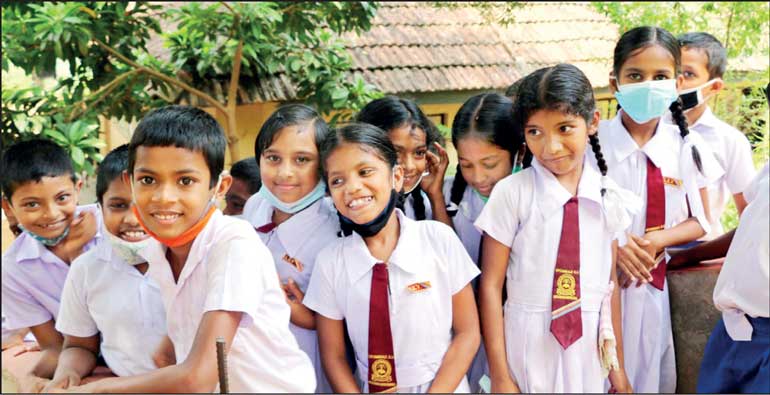Wednesday Feb 18, 2026
Wednesday Feb 18, 2026
Friday, 1 September 2023 00:26 - - {{hitsCtrl.values.hits}}

 “There can be no keener revelation of a society’s soul than the way in which it treats its children.” - Nelson Mandela, 1995
“There can be no keener revelation of a society’s soul than the way in which it treats its children.” - Nelson Mandela, 1995
Sri Lanka defaulted on its external debt obligations amid a deep economic crisis last year. Across the country, the majority of families are still suffering. Even among those who were previously secure, many have fallen into deep poverty and the crisis has left almost no one untouched. The greatest challenges are felt by households that include children. If countries do not invest in their children, they put their future well-being and prosperity at risk.
A recently published article in The Guardian states, “Hunger is the norm in Sri Lanka now. Last October, the health ministry found that 42.9% of under-fives in Sri Lanka have some form of under-nutrition. A March 2023 report by the Medical Research Institute says that 19.8% of children between six and 59 months suffer from wasting, the most acute form of malnutrition that occurs when children don’t have enough quality food or have prolonged illnesses.” 1
Sri Lanka sought IMF support to restructure its external debts (US$ 36 billion) and signed an Extended Fund Facility (EFF) agreement that initiated the process in March 2023. However, the agreement fails to provide a sustainable solution to the debt crisis.
External international sovereign bondholders (US$ 12 billion), particularly the foreign private creditors, who already benefited from high-interest payments for their risky investments, have been delaying the external debt restructuring negotiations. They are unwilling to accept losses of a magnitude that can make a difference to Sri Lanka, particularly to its children.
As the external debts have not yet been restructured, the Government should suggest “Debt for nurture” swaps that can fund Universal Child Benefits (UCB) and help cushion the country’s most valuable asset, its children, from the impact of the economic crisis and policy adjustments. It would also go some way in addressing feminist activists’ and scholars’ call for recognising the centrality of social reproduction that keep the economy ticking and promotes a gender sensitive perspective on the debt crisis. 2
What are Debt for nurture swaps?
Creditors provide debt relief (in addition to large-scale debt reduction) in return for a Sri Lanka Government commitment to, say, invest in social safety net programs. Debt for nurture swaps can seek to free up fiscal resources so that Sri Lanka can improve its resource base without triggering a fiscal crisis or sacrifice spending on other development priorities.
Such transactions may enable the country to simultaneously reduce its debt burden, while also liberating additional funds that can be put towards building a strong safety net. For creditors too, participating in a swap allows them to demonstrate a commitment to address social and gender justice in Sri Lanka.
Sri Lanka needs Debt for nurture swaps not Debt for nature swaps
Sri Lanka's Central Bank Governor Nandalal Weerasinghe said to Reuters in Washington, DC in April 2023, that the country is open to considering the option of a Debt for nature swap if a request is made.7
Debt for nature swaps are promoted as a means to free the debtor country from some debt servicing in exchange for a commitment to spend at least some of the saved money on a specified environmental protection program.
Debt for nature swaps are not an adequate solution to Sri Lanka’s debt or economic crises. Furthermore, their implementation can pose significant risks and challenges, causing harm to debtor governments and citizens. Instead, Sri Lanka’s attention must remain focused on solutions that will address large-scale external debt reduction across all creditors and provide sustainable financing to build a strong social safety net.
According to the Climate Action Network, a global network of more than 1,900 civil society organisations in 130 countries, debt for nature swaps present many challenges and risks 8:
The erosion of national sovereignty and democratic ownership, unlikely meaningful contributions to debt or climate crises, questions about conservation effectiveness, social inequities, legitimising odious debts, lack of transparency and accountability, a distraction for the need for additional ‘loss and damage’ funds, decarbonisation without decolonisation of finance, and long-term sustainability concerns, all contribute to the ongoing debates surrounding these arrangements.
Debt for nurture swaps, on the other hand, can better address the priorities of Sri Lanka provided the relevant controversies and risks surrounding Debt for nature swaps are addressed during their implementation. But debt swaps do have their critics, not least because scoring investments on social metrics is inherently subjective. Debt for nurture swaps, therefore, need to have clearly measurable objectives to be meaningful.
Debt for nurture swaps cannot resolve Sri Lanka’s debt crisis on its own as it does not involve a sufficiently large share of its external debt and substantial relief. Swaps are thus not substitutes for broad-based external debt restructuring.
The need for universal social protection
IMF’s Debt Sustainability Analysis for Sri Lanka recommends the strengthening of social safety nets that better target the poor3. However, as the crisis is universal, it makes little sense to target the poorest members of society. Sri Lanka has several schemes in place that aim to target populations living on low incomes, notably Samurdhi, senior citizens’ allowance and disability allowance.
Nevertheless, a large number of intended recipients remain excluded. This is because of the Government’s inability to effectively identify those who are eligible for these programs using social registries. Even among the limited proportion of the population that Samurdhi aims to reach, in 2019, around 56 % of households were not reached by the program.
Global evidence indicates that all social registries have failed abysmally in achieving their core purpose of accurately identifying the beneficiaries of social programs. By using the same targeting methodology across a range of social programs, social registries systematically exclude the majority of the poorest members of society from multiple schemes, causing significant harm.4
Costs for providing Universal Child Benefits in Sri Lanka
An UNICEF Working Paper published in June 2023 titled “Building the case for a lifecycle protection system in Sri Lanka” concludes that the cost of an effective Universal Child Benefit program could peak at 0.8% of GDP (US$ 800 million) in 2038. It would include a modern and inclusive system with the eligibility of child benefits expanded from 0-18 years. The report proposes a monthly payment of US$ 14 for each eligible child (equivalent to 6.55 % of GDP per capita). The payments should be inflation-indexed, with at least quarterly indexing, given the current high Consumer-Price-Index rates.5
By increasing consumption and stimulating demand in local economies, as well as by contributing to a healthier, more educated and hence more productive future workforce, investments are predicted to contribute to economic growth, thereby supporting economic recovery and building resilience.
This shows that, even though it might be challenging to negotiate Debt for nurture-swaps with external creditors, investing in children is a socio-economic necessity and a highly strategic policy choice. Investing in Universal Child Benefits can unleash a virtuous cycle of increased income security, improved human capabilities, greater trust and stronger and more resilient economic growth.
Funding for Universal Child Benefit
The IMF’s EFF agreement included a commitment on the part of the Sri Lankan Government that it would reduce all debt, domestic and external, and not just the external debt that was the source of the crisis.
To address that, the IMF’s debt sustainability assessment makes a case for the outflow on account of foreign debt servicing to fall from 9.4 % of the GDP to below 4.5 % of the GDP over the 2027-2032 period. This is because the reduction required of foreign private creditors is limited to a modest 30 %.6
Sri Lanka’s Government should instead be negotiating for a combination of foreign private debt cancellation or a significantly higher external debt reduction than the modest 30% offered which could additionally include Debt for nurture swaps. Foreign debt servicing levels would fall to below 3.7% of GDP to release additional funding (0.8% of GDP by 2032) for a Universal Child Benefit scheme.
The impacts on child well-being would be significant not only among the poorest families but also among those in the middle with low and insecure incomes. The UCBs would reach a high proportion of the population – either as direct or indirect recipients, given that children are found in most households. If families spent the benefit only on children, this could make a major difference in their lives, improving their nutrition and enabling families to invest in other activities that are conducive to children’s learning, including their home environment, thereby enhancing educational outcomes.
Sri Lanka’s meagre 0.6% spending target (possibly rising to 0.7% in outer years) on the social safety net, in accordance with the IMF agreement, would not adequately address the widespread nature of low incomes and declining living standards. The country must take the first step towards building an inclusive Universal Child Benefit program that more comprehensively and adequately protects the well-being of all Sri Lankan children and provides the basis for a more equitable growth trajectory.
Well-being of Sri Lanka’s children
Sri Lanka’s children can benefit from an external debt restructuring program that considers the following:
Full cancellation of private creditor debts: The only genuinely sustainable debt management strategy
Large-scale external debt reduction: The modest 30% reduction offered by SL Government following the domestic debt restructuring process is inadequate; it should provide at least the 50% external debt reduction proposed in the original IMF EFF draft.
Debt for nurture swaps: Additional funds, over and above existing social spending, are needed for a social safety net that includes universal child benefit. The implementation requires Government ownership over how the funds would be allocated, as opposed to a third party/non-governmental entity.
Debt for nature swaps: Although protecting Sri Lanka’s biodiversity and environment is essential, pursuing these financial instruments is not the current priority for the country due to many surrounding controversies and risks. Sri Lanka requires debt cancellation for climate justice.
Investments in implementing Universal Child Benefits should play an integral part in any solution. Hence, implementing a Debt for nurture scheme would be appropriate when there is prioritisation of social equity, meaningful engagement of stakeholders, transparency, ownership, and the development of sustainable financing mechanisms.
With such measures, debt for nurture swaps can strike a balance between debt relief and the effective enhancement of the well-being of the children of Sri Lanka.
References:
Zinara Ratnayake, The Guardian, No milk, no eggs, small hope: fears rise for Sri Lanka’s malnourished children, 15 August 2023
Kanchana N Ruwanpura, Bhumika Muchhala & Smriti Rao. Daily FT, Sri Lanka. Gendering the debt crisis: Feminists on Sri Lanka’s financial crisis. November 2022
Staff Report, IMF, Request for an extended arrangement under the Extended Fund Facility. March 2023
Dr Stephen Kidd, Diloá Athias & Idil Mohamud (Development Pathways). Social Registries: A short history of abject failure, June 2021
Building the case for a lifecycle protection system in Sri Lanka, UNICEF Sri Lanka Working Paper. June 2023
Prof C.P. Chandrasekhar: The Hindu, Sri Lankan debt crisis to get worse if IMF prescription is heeded, 13 July 2023
NewFirst.lk, Sri Lanka open to consider Debt for nature swap to overcome crisis, 12 April 2023
Climate Action Network: Position on Debt Swaps, May 2023.
(The writer is a former elected Local Councilor for London Borough of Enfield in the United Kingdom and could be reached via email [email protected])